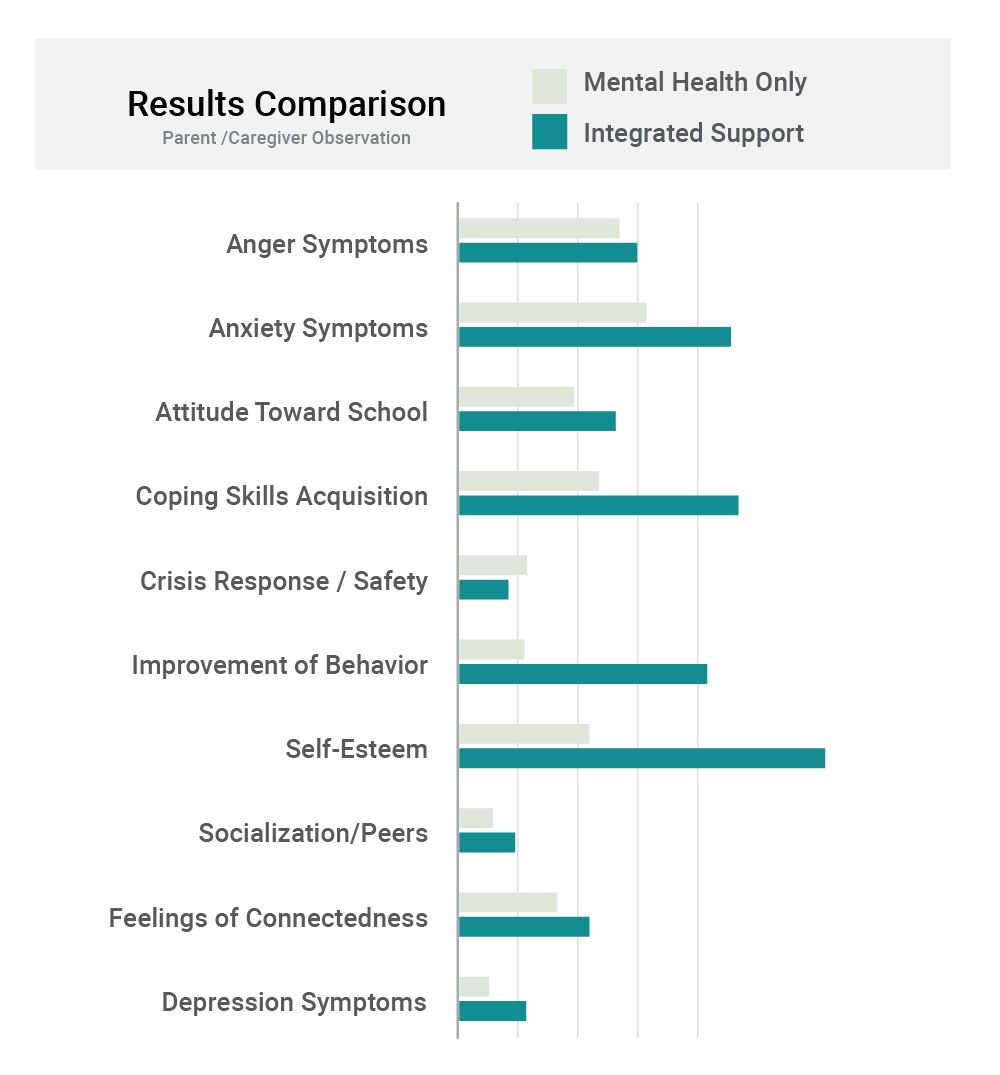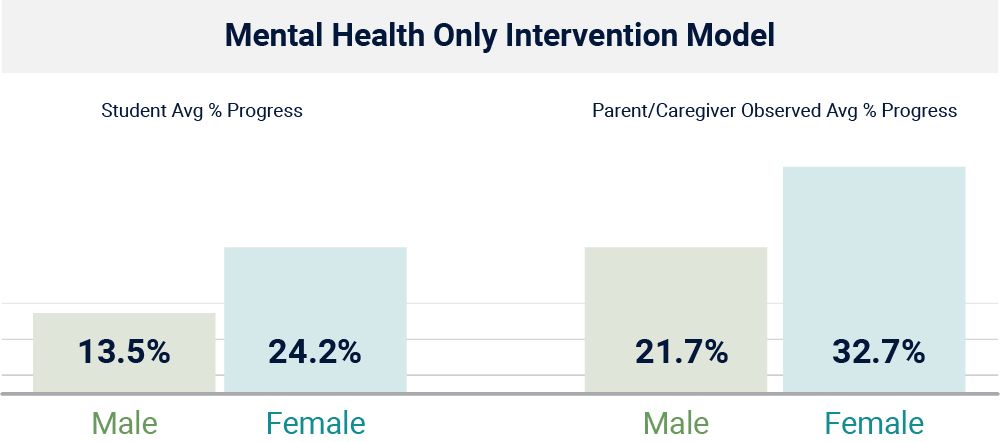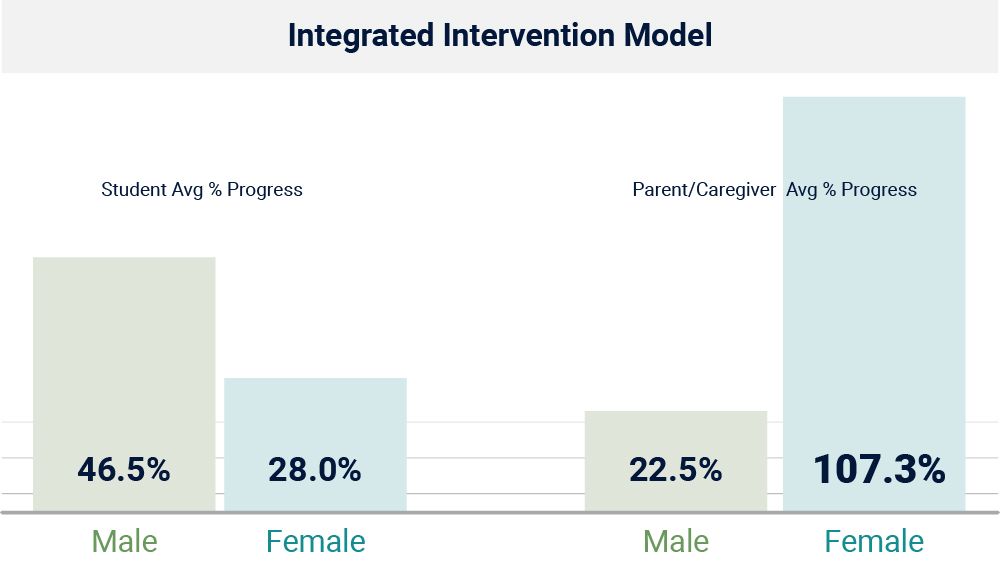Invo recently compared the benefits of offering integrated services combining multiple points of intervention versus solely offering mental health services. The purpose of this project was to provide an exploratory analysis of the efficacy of an alternative treatment model primarily for elementary aged students that provides mental health services and/or a combination of mental health and behavioral health as integrated services. This program evaluation was a collaborative effort between the staff of the Clemson University Center for Behavior Analysis (CBA) and INVO Healthcare, Inc. Find more information here about our partnership with Clemson University and data validation / accountability.
The study showed that those receiving integrated services as compared to mental health services only, saw greater progress within several domains indicating well above a 100% improvement.
Mental health services consisted of services provided by Qualified Mental Health Professionals (QMHP). Integrated services consisted of services provided by a combination of QMHP’s, Board Certified Behavior Analysts (BCBA) and Behavior Support Specialists, and include targeted behavioral interventions.
 Integrated Model is Efficient and Effective
Integrated Model is Efficient and Effective
Despite the intensity of support, integrated services were delivered within a similar time frame and dosage as Mental Health-Only services yet resulted in significantly stronger gains.
The results indicate that in all domains, both students and parent/caretaker(s) reported progress.
The average student and parent/caretaker reported domain progress was higher for those receiving integrated services as compared to mental health only. Parent/Caretaker observation saw several domains indicating well above a 100% improvement including anxiety symptoms, improvement in behavior, coping skills acquisition, and self-esteem.
Producing Outcomes with Mental Health Only Solutions
Both the mental health-only and integrated services models led to significant improvements in student outcomes across all measured domains—anger, anxiety, depression, self-esteem, coping skills, and more.

The students self-reported positive progress, but the parent/caretaker(s) indicated higher levels of progress for both groups with the females displaying approximately 11% more progress than males.
Integrated Model Showed Most Substantial Gains
Students receiving integrated services (QMHP + BCBA + BSS support) showed the highest progress, particularly in areas like anxiety reduction, behavior improvement, self-esteem, and feelings of connectedness. The parent/caretaker(s) reported many of these domains saw over 100% improvement.

Both male and female students displayed progress according to the students, but the males displayed approximately 18.5% more progress than the females.
According to the parent/caretaker(s), again, both males and females displayed progress, but the parent/caretaker(s) indicated significantly higher levels of progress for females as compared to males, with the females displaying approximately 84.8% more progress than males.
Invo specializes in providing solutions that meet every need, from supplementing an entire district’s staffing needs, to finding specialists for an individual child. Reach out today to learn more about this study and how you can see these same outcomes.
Implications for General Education
Nearly all students in the study were part of the general education population. Only one had an IEP, and none had 504 plans—highlighting the value of the IMPACT model for students who typically wouldn’t qualify for special education services but still require substantial support. (Phase II and Phase II pulls will demonstrate a higher special ed pop)
Gender Insights
Males were more likely to receive integrated services, suggesting a higher likelihood of externalizing behaviors, while females tended to report lower self-esteem and more internalizing symptoms such as depression and disconnection from school.
Validated Process
The INVO Outcome Scale (IOS), though not yet independently validated, was instrumental in capturing progress from both student and guardian perspectives across 10 core mental health and social-emotional domains.
Definitions & Scope
These services were delivered on different public school campuses from within two separate school districts by the INVO Healthcare, Inc. IMPACT℠ program.
When determining whether a student receives mental health-only treatment or integrated treatment, the presence of co-morbid significant intrinsic and extrinsic concerns is strongly considered.
Additionally, students who qualify for an integrated treatment plan typically have a substantial history of mental health challenges coupled with intensive maladaptive behavioral issues, such as physical aggression, self-injurious behaviors, verbal aggression, property destruction, and/or elopement.
Those students may also be at significant risk of academic failure, potential engagement with the Department of Juvenile Justice (DJJ), and/or have a history of suicidal attempts or ideation, further underscoring the need for comprehensive and intensive support.
In both forms of service, the beginning step in the service process is to have both the student and guardian separately complete the INVO Outcome Scale (IOS).
The IOS is a structured questionnaire based on the Children’s Psychological Flexibility Questionnaire (Dixon and Paulilunas, 2017).





